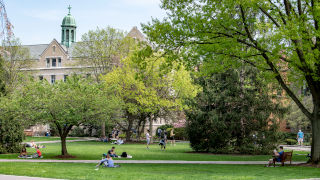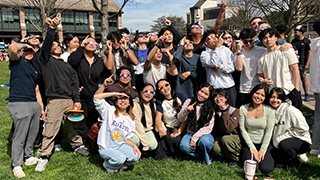Seton Hall Rises Again in Wall Street Journal/Times Higher Ed Ranking
Thursday, September 23, 2021

According to the National Center for Education Statistics, at last reckoning there were 2,828 four-year Title IV colleges and universities in the United States.
Among the Wall Street Journal/Times Higher Education list of the Top 797, Seton Hall was ranked at #279 – which puts it in the Top 35 Percent of the "Top Colleges and Universities" nationwide.
Seton Hall rose 36 places this year over last in the ranking; and over the past two years the University has risen 53.
"Seton Hall has consistently been recognized for its academic excellence and its student outcomes," said Provost Katia Passerini. "Each year it seems our incoming classes break records for the number of applicants, largest class, GPA, test scores and diversity. The University is truly a home to the best and the brightest and the rankings have begun to reflect this."
More Ranking Success
This latest ranking from Wall Street Journal/Times Higher Education (WSJ/THE) comes quickly on the heels of Seton Hall's recognition again in a number of other rankings, including Forbes, The Princeton Review and U.S. News & World Report, which ranked the University this year at #127, rising six places from last year and 12 in the last two years.
In the U.S News ranking there are only 392 National Universities derived by U.S. News from The Carnegie Classification of Institutions of Higher Education. The placement of Seton Hall at 127 put the University among the Top Third of all National Universities.
Wall Street Journal/Times Higher Education Methodology
According to The Wall Street Journal/Times Higher Education (WSJ/THE), "the ranking adopts a balanced scorecard approach, with 15 individual performance indicators combining to create an overall score that reflects the broad strength of the institution." The data it uses "come from a variety of sources: the US government (Integrated Postsecondary Education Data System – IPEDS), the College Scorecard, the Bureau of Economic Analysis (BEA), the THE US Student Survey, the THE Academic Survey, and the Elsevier bibliometric dataset."
The overall methodology covers four key "pillars"—Resources, Engagement, Outcomes, and Environment. Seton Hall scored the strongest in the Outcomes and Environment areas.
Outcomes
The outcomes category represents 40% of the total weight (the highest weight of all categories) and focuses on how institutions deliver successful outcomes to its students. Within this area, WSJ/THE examines graduation rates, graduate salary, debt after graduation and academic reputation. Seton Hall ranked among the top 35% in this category at #275.
Environment
The environment pillar (10% of total weight) looks at the make-up of the student body and whether institutions are providing diverse, supportive, and inclusive learning environments. Student diversity is measured by their ethnic/racial composition, proportion of international, and inclusion of students with lower family earnings. Faculty racial/ethnic diversity is also included. This was Seton Hall's strongest pillar with an individual rank of #257, placing the University in the top third of colleges assessed by WSJ/THE.
"It's not surprising that we scored well for Environment, Seton Hall is a welcoming campus and has long been a University of opportunity," said Senior Vice President for Enrollment Management Alyssa McCloud. "And any ranking that heavily weights student academic success, outcomes – and employment especially – is a ranking in which Seton Hall will naturally flourish and excel," she said. "The value of a Seton Hall degree is a proven commodity in boardrooms, courtrooms, classrooms, offices and hospitals all across America each and every day."
In 2019 (last year the ranking was computed), with an employment score of 92.55 percent, Seton Hall ranked first among all private colleges and universities in New Jersey in a ranking that used data from IPEDS and the U.S. Department of Education's "College Scorecard." Seton Hall performed better in employment for its graduates than Princeton, Rutgers (New Brunswick, Newark and Camden), Monmouth University, Stevens Institute of Technology and Drew.
The WSJ/THE US College Rankings 2022 may be accessed via The Times Higher Education or through The Wall Street Journal.
Categories: Education





